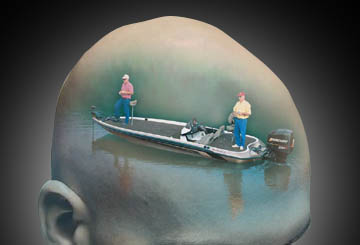What does it take to win?
Winning involves more than a secret spot or a magic lure

“The difference between good and great is very small, but it is made up of many things.”
Readers of this column know I don’t quote people very often. Telling you what Larry Nixon thinks or what Jim Moynagh says flies in the face of one of my most important performance-psychology principles: Learn to think for yourself.
However, these words provide the best answer I know to the question asked in the title of this month’s column. I’m not sure if this an original quote, but since I heard it first from Rick Clunn, he gets the credit.
Fishing vs. competing vs. winning
If you have been on the tournament-fishing scene for some time, you are probably familiar with the different stages competitive anglers go through on the way to being successful. When the competitive bug first bites, the novice angler is filled with a combination of awe, wonder and panic. You think it might be fun to fish a tournament, but it seems like a scary proposition. Nevertheless, you eventually decided to sign up and give it a go.
In the beginning, you most likely felt out of place, though at another level, it was great fun being around good, competitive fishermen. I’m sure you remember your initial nervous energy at registration dinners and pretournament meetings. There you were, finally, sitting at the same table with well-known competitors, guys with their names and sponsor logos on their shirts!
Then, on tournament day, there was the excitement in the misty morning air, the rocketship ride up the lake and finally your first cast a tournament fisherman. And whether or not you caught anything, the real thrill came later in the day when the bags were brought to the scales. Look at those fish!
In these first competitions, it was enough just to be in a real tournament. Certainly, you wanted to do well, but you knew you were not in the same league as the big boys; your expectations were small. If you got lucky and caught a few fish, you had something to be happy about. Typically, however, you are a spectator rather than a participant at the weigh-ins.
Even touring pros fondly recall that “happy to be here” stage. However, for the true competitor, that stage does not last very long. Watching other people hold up big fish gets old fast. At some point, you decided you not only wanted to have a fancy shirt and a cool boat, you wanted to consistently catch fish.
Competing
You probably remember the internal conversations you had at that point. Maybe you began by telling yourself how stupid it was to fish where you did because that’s not where the tournament winners fished. Remembering how Dad or Grandpa talked about scoping out secret fishing holes, you started paying attention to where the top finishers spent their day. You were very sure it must be the spot. After all, they caught their fish on spinnerbaits, and you have a spinnerbait, right?
I’m sure you smiled as you read that last sentence. Ever since our Neanderthal relatives began jerking fish from the water using a piece of meat impaled on a bone hook, anglers have been seeking “The Secret Spot.” In retrospect, the simplistic attitude you demonstrated then was comical. The old saying “I didn’t know what I didn’t know” comes to mind, eh? But at least you were paying attention to one important part of the complex equation that successful competitors use.
However, it didn’t take long to realize it wasn’t just the spot, because, well, “the spot” on which tournaments were won seemed to move around from month to month and from year to year. As you participated in more tournaments, you found that the lures, the locations and the people who won changed quite a lot, actually, from one competition to the next. You began to consider that the formula for success might be more complex than you had originally imagined.
You also began to notice that some anglers consistently finished high in the standings, leading to the obvious conclusion that tournament success was more than just luck. It took a little longer, but you also eventually figured out that imitating tournament winners was a losing proposition. Fishing this tournament the way the last tournament was won turned out to be a lot like a dog chasing its own tail.
Winning
It didn’t happen right away, but eventually you began to develop confidence in a few baits, and you also formed a tentative sense of where the fish were likely to be on different waters at different times of the year. You still made a lot of mistakes, and while you may have cashed a check now and then, winning was still an elusive concept. If you are highly competitive, and I suspect you are, you remember how difficult it was to turn in one mediocre performance after another.
At this juncture, many people give up, or they reach a plateau beyond which they struggle to progress. Continued improvement now, you may recall, required as much courage, fortitude and tenacity as anything else.
Which brings us to back to the opening quote. As for other top professionals, your door to winning swung open the day you came to appreciate that while there are a lot of individual little things that can lose a tournament for you, there is no one thing that creates a winner.
Winning, as opposed to placing high, is not principally related to a secret spot or a magic lure. Instead, winning involves many things, all of which matter. That’s an important psychological concept to appreciate, so let me say it again: Winning involves many things, all of which matter.
It includes practical dimensions like having reliable equipment and mastering fundamental fishing skills, and it requires knowledge of things like fish behavior and the effect of weather on the location and movement of baitfish. Winning also is related to hard work, long hours of practice, the ability to learn from your mistakes and a host of other psychological variables such as confidence, poise under pressure and resilience in the face of adversity.
 And one of the most fascinating things of all is that the specific list of things it takes to win varies, sometimes significantly, from one angler to the next. Jim Moynagh doesn’t fish just like Larry Nixon, and he doesn’t fish exactly like Dion Hibdon, or anyone else for that matter. While those guys have a lot in common with each other and with other top pros, they have each figured out a unique set of fishing skills that has allowed them to be winners. On your way to becoming a winner, you will probably end up doing the same.
And one of the most fascinating things of all is that the specific list of things it takes to win varies, sometimes significantly, from one angler to the next. Jim Moynagh doesn’t fish just like Larry Nixon, and he doesn’t fish exactly like Dion Hibdon, or anyone else for that matter. While those guys have a lot in common with each other and with other top pros, they have each figured out a unique set of fishing skills that has allowed them to be winners. On your way to becoming a winner, you will probably end up doing the same.
Jay T. McNamara, Ph.D., L.P., is a psychologist, who is also an avid bass and walleye angler. With more than 26 years of professional experience complemented by participation in competitive fishing at local and national levels, he is uniquely qualified to illustrate how performance psychology principles apply to tournament fishing.